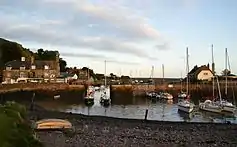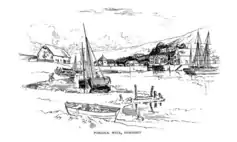Porlock Weir
Porlock Weir, about 1.5 miles west of the inland village of Porlock, Somerset, England, is a small settlement around a harbour. Porlock means place of the port and Porlock Weir is its harbour.[1] Weir refers to salmon stakes and traps that were situated along the shore.[2] It is a popular visitor attraction.
| Porlock Weir | |
|---|---|
 Porlock Weir harbour in early light | |
 Porlock Weir Location within Somerset | |
| OS grid reference | SS863479 |
| District | |
| Shire county | |
| Region | |
| Country | England |
| Sovereign state | United Kingdom |
| Post town | MINEHEAD |
| Postcode district | TA24 |
| Dialling code | 01643 |
| Police | Avon and Somerset |
| Fire | Devon and Somerset |
| Ambulance | South Western |
| UK Parliament | |
Many cottages date from the 17th century, including the Gibraltar Cottages which have been designated by English Heritage as a grade II listed building.[3]
Like most ports in West Somerset, the harbour is tidal and is home to a small flotilla of yachts and is visited by many more in spring and summer. The port has existed for more than a thousand years. The Anglo-Saxon Chronicle reports that in 1052 Harold Godwinson came from Ireland with nine ships and plundered the area and before that in 866 AD it was raided by Danes. In the 18th and 19th centuries coal from South Wales was the main cargo and in World War II pit props cut in local forests were the return cargo.[4]
The ketch, Lizzy, was wrecked at Gore Point, near Porlock Weir. The ship, built in Appledore, was spotted in trouble off Lynmouth in a storm in 1854. The ship had lost her masts, and was in very bad condition. A fishing boat was sent out to rescue the crew, as Lynmouth possessed no lifeboat. The boat reached the stricken ketch, rescued the crew and returned to Lynmouth safely. The weather improved, and a fresh crew, with the vessel's skipper attempted to salvage her. They improvised with a scrap of sail, and managed to get safely around Foreland Point. They sailed on all night, only just managing to keep the ship afloat. When they reached Gore Point, a mile from Porlock Weir, the ketch sank in shallow water. The wreck lies submerged off the point.[5]
On 12 January 1899, in a storm, the ten-ton Lynmouth lifeboat was launched, but because of the ferocity of the storm could not put out to sea, and was hauled by men and 20 horses over Countisbury and Porlock Hills to Porlock Weir where the water was less rough.[6] Thirteen seamen were rescued.[7]

The South West Coast Path and other trails link to Porlock Ridge and Saltmarsh and Culbone, the smallest parish church in England.
In September 2018 Porlock Weir Gig Club[8] was setup by Ben Allerton. The club currently has over 40 active members.
References
- "History of Porlock Weir". Retrieved 30 August 2016.
- "History of Porlock Weir". Retrieved 30 August 2016.
- Historic England. "Gibraltar Cottages (1252283)". National Heritage List for England. Retrieved 20 February 2008.
- Farr, Grahame (1954). Somerset Harbours. London: Christopher Johnson. p. 154.
- Hesp, P. (1993).Exmoor and West Somerset Coastline. Countryside TV Productions. ISBN 1-898818-00-2
- Leete-Hodge, Lornie (1985). Curiosities of Somerset. Bodmin: Bossiney Books. p. 45. ISBN 0-906456-98-3.
- "Overland Launch Overnight January 12th. /13th.1899". Lynton & Lynmouth. Archived from the original on 12 October 2010. Retrieved 3 April 2009.
- "Porlock Weir Gig Club". Retrieved 20 December 2019.
External links
![]() Media related to Porlock Weir harbour at Wikimedia Commons
Media related to Porlock Weir harbour at Wikimedia Commons
Official Porlock Weir Website | https://porlockweir.co/